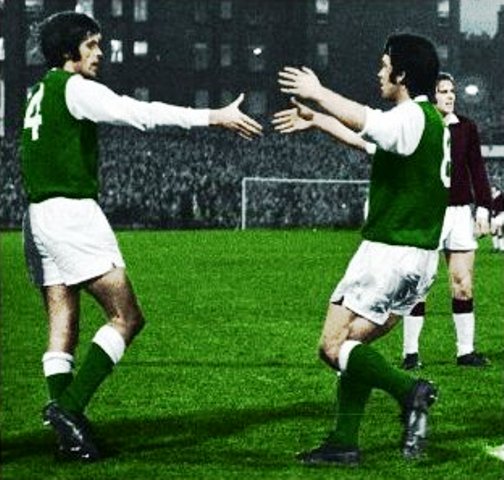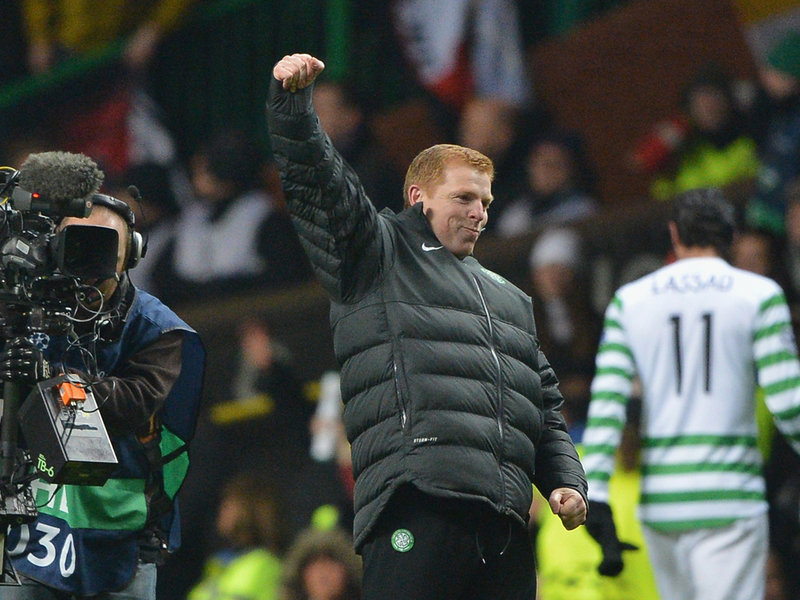One of the few joys of shopping in Braehead is that it gives me the opportunity to look at any new football books that appear on the market. I have a fairly eclectic taste in football books and I am willing to have a peak at anything that takes my interest, not necessarily exclusive to Celtic, and two books took my eye on my last visit which focus on two great Scottish sides from the distant past.
On New Years’ day 1973 my Father and I settled down to watch Sportsreel with Archie McPherson who were showing highlights of that day’s Edinburgh derby between Hearts and Hibs at Tynecastle.
It wasn’t unusual back then to watch highlights of a game without knowing the score and as we’d been out all day first footing we were happy to relax and watch the game in blissful ignorance of the result. My father and I are 100% dyed in the wool Celtic fans – real Tims through and through – but that game will forever stay with me because Hibs absolutely annihilated Hearts by 7-0 and what’s more did it in their own midden.
It wasn’t that Hibs won but they won playing attacking football with real style and panache and there is a book now out which commemorates that game called ‘The game on New Year’s day’ which describes the events of not only that match but tells the story of the great Turnbulls’ Tornados team of 1972/73.
To put things in perspective Hibs beat Sporting Lisbon 6-1 in the European Cup winners cup, beat Rangers in the League Cup semi final, beat Celtic 2-1 in the League cup final and rounded it off by beating Hearts 7-0 at Tynecastle – all of this in the space of a couple of months.
Boys of my age at the time could rhyme of great teams from one to eleven in the days before squad numbers took hold and became the order of the day. The Hibs team is easy to remember.
Herriot, Brownlie and Schaedler;
Stanton, Black and Blackley;
Edwards O’Rourke and Gordon;
Cropley and Duncan.
There is almost a poetic charm to reading the line up in the old fashioned way, what my old Maths teacher Matt Lynch used to call ‘a litany’, when rhyming off great Celtic sides of the past.
Unfortunately for Hibs it wasn’t to last. Early in 1973 John Brownlie broke his leg and he proved a hard man to replace. In the ECWC quarter finals they surrendered a 4-2 first leg lead against Hadjuk Split and went out 5-4. After that game Turnbull attempted to dismantle his side a decision which many Hibees rue to this day.
But in the winter of 1972/73 they were easily the best team in Scotland and will hold dear that 7-0 win over the Jambos forever more.
Looks a good book and I would like to read more of it.
The other book I had a peek at was a new biography of the old Rangers manager Scot Symon. My Father is a true football fan and when I was younger he and his friends would recall the great sides of the past such as Hibs’ famous five, Hearts’ side of Conn, Bauld and Wardhaugh and the great Dundee side of the early 1960’s which reached the European Cup semi finals.
He also had a tremendous admiration of the players of his day such as John White, Alan Gilzean, Ian St John and Jim Baxter.
Years ago I remember him telling me that the best Rangers side he ever saw was the team which Scot Symon put together in the early 60’s which contained the forward line of Henderson, McMillan, Miller, Brand and Wilson. Again, despite his love of Celtic, my Dad had a magnanimous attitude when watching football and knew talent when he saw it.
My recollection of Scot Symon was that he was ruthlessly sacked by Rangers when they were top of the league when Celtic were away in Argentina for the games against Racing Club in late 1967. It was a real shock at the time and it’s said that Celtic officials in South America refused to believe it when they heard the news.
Strange thing about this book is that when I opened four random pages to read it the story was less about Symon and more about Jock Stein. Some of the comments were cutting and reputed that big Jock was a gambler, a womaniser and a manipulator.
This may or may not be the case but perhaps the title of this book should have been ‘obsession’ because rather than focus on that great Rangers team the author appears to be obsessed by Jock Stein and his subsequent success with Celtic. It seems that some people will stoop to any level to denigrate the great man’s reputation.
One wonders if there is any reference to Rangers ‘signing policy’ of the period for which they were infamous in football at that time. Suppose not but it’s always disappointing when author’s focus on their own prejudices rather concentrate on the subject matter of the book.
It does confirm one thing though. It’s still, very, very cold in his shadow.




